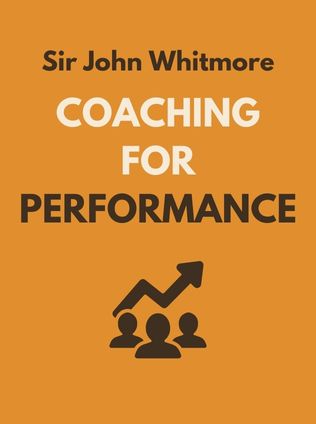
Coaching for Performance
By Sir John Whitmore
Published 01/1992
About the Author
Sir John Whitmore was a pioneering figure in the field of coaching, particularly in the business world. His work, Coaching for Performance, first published in 1992, is considered one of the foundational texts in the coaching industry. Whitmore’s contributions to the development of coaching, particularly the GROW model, have had a profound impact on how leaders approach the development of their teams. He was a champion of the idea that coaching is not about instructing or directing, but about helping individuals unlock their own potential. Throughout his career, Whitmore emphasized the importance of empowerment, self-awareness, and personal growth as key drivers of performance in any organization.
Main Idea
Coaching for Performance advocates for a shift from traditional, directive forms of management to a more collaborative, coaching-oriented approach. Whitmore argues that by focusing on coaching, leaders can help their employees develop their full potential, leading to better performance, higher engagement, and a more dynamic organizational culture. The book outlines the principles and practices of effective coaching, emphasizing the role of the coach in fostering self-confidence, self-awareness, and responsibility among coachees. Whitmore’s central thesis is that coaching is not just about achieving specific outcomes, but about developing people in a way that enables them to reach their highest potential.
Table of Contents
- What is Performance Coaching?
- The Importance of Performance Coaching
- Types of Performance Coaching
- The GROW Model: A Framework for Coaching
- Building Trust and Connection
- Empowering Coachees to Maximize Potential
- Setting and Achieving Goals
- Measuring Organizational Culture and Performance
What is Performance Coaching?
Performance coaching, according to Whitmore, is a process that focuses on enhancing an individual’s strengths and capabilities. Unlike traditional management approaches that often involve giving direct instructions or solving problems for employees, performance coaching is about facilitating the coachee’s own learning and development. The coach’s role is to ask questions, provide feedback, and help the coachee explore different perspectives and options. The goal is to enable the coachee to discover their own solutions and take ownership of their growth.
"Coaching is unlocking a person’s potential to maximize their own performance. It is helping them to learn rather than teaching them." — Sir John Whitmore
Whitmore’s approach to coaching is rooted in the belief that everyone has the potential to grow and improve. The coach’s job is to create the conditions in which that growth can happen. This involves creating a safe, supportive environment where the coachee feels empowered to explore their own thoughts, feelings, and behaviors. It also involves helping the coachee set challenging yet achievable goals, and providing the support and encouragement they need to reach those goals.
The Importance of Performance Coaching
In today’s fast-paced, constantly changing work environment, traditional management models are increasingly seen as outdated and ineffective. Whitmore argues that performance coaching is more relevant than ever because it aligns with the needs of modern organizations. Performance coaching is particularly valuable in a VUCA (Volatile, Uncertain, Complex, Ambiguous) world, where the ability to adapt, innovate, and respond to change is critical for success.
Whitmore identifies several key benefits of performance coaching:
- Maximizing Performance: Coaching helps individuals and teams unlock their potential, leading to higher performance and greater innovation.
- Improving Job Satisfaction: Employees who feel supported and valued are more engaged, satisfied, and likely to stay with the organization.
- Enhancing Communication: Coaching fosters open, honest communication, which is essential for collaboration and problem-solving.
- Promoting Continuous Learning: Coaching encourages a culture of continuous improvement, where employees are motivated to learn and grow.
Performance coaching also helps to build a culture of trust and collaboration within organizations. When leaders act as coaches, they create an environment where employees feel valued and respected. This, in turn, leads to higher levels of engagement, productivity, and retention. In a world where competition for talent is fierce, the ability to attract and retain top performers is a key competitive advantage.
Sign up for FREE and get access to 1,400+ books summaries.
You May Also Like
The Subtle Art of Not Giving a F*ck
A Counterintuitive Approach to Living a Good Life
By Mark MansonRich Dad Poor Dad
What the Rich Teach Their Kids About Money - That the Poor and Middle Class Do Not!
By Robert T. KiyosakiHow To Win Friends and Influence People
The All-Time Classic Manual Of People Skills
By Dale CarnegieQuiet: The Power of Introverts
The Power of Introverts in a World That Can't Stop Talking
By Susan Cain



















